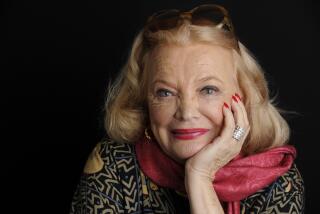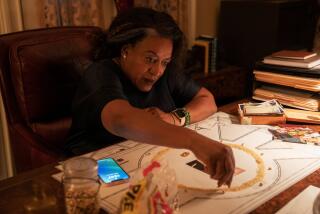Gale Sondergaard, Famed for Film Villain Roles, Dies
- Share via
Gale Sondergaard, a consummate actress whose dramatic skills brought her both the first Academy Award ever given for a supporting performance and then a succession of parts that turned her into Hollywood’s reigning female villain, is dead.
She died Wednesday at the Motion Picture and Television Hospital in Calabasas, where she had been a patient since 1982.
Her death at age 86 was attributed to a cerebral vascular thrombosis, which followed a series of strokes.
The actress who became Sherlock Holmes’ nemesis in “Spider Woman” was also a veteran of Shakespearean plays and America’s classical theater. Before coming to Hollywood, she had succeeded Lynn Fontanne and Judith Anderson as Nina in Eugene O’Neill’s “Strange Interlude” on Broadway.
She first went on stage in Detroit after graduating from the University of Minnesota, where her father was a professor. She toured with traveling Shakespearean companies before coming under contract to the New York Theatre Guild, once portraying Gertrude to Melvyn Douglas’ Hamlet.
Her second marriage to director Herbert Biberman brought her to Hollywood in the mid-1930s, where she and Walter Brennan won plaques for their supporting work. Hers was for her role as Faith Paleologus in the 1936 film, “Anthony Adverse.”
(Before that, the Academy of Motion Picture Arts and Sciences honored only lead players with Oscars, and it was not until 1943 that supporting actors received statuettes rather than plaques.)
The same marriage that brought her to Hollywood also helped destroy her career. Biberman, who died in 1971, became one of the Hollywood 10, a group of actors, writers and directors imprisoned for refusing to testify before the House Un-American Activities Committee, which held postwar hearings into alleged communist infiltration of the motion picture industry.
Called before the same committee in 1951, Miss Sondergaard took the Fifth Amendment, saying later that she was “proud to having taken a stand.”
At the time, she was at the apex of her career, having been nominated for another supporting Academy Award in “Anna and the King of Siam” in 1946. In it, she played Lady Thiang, the No. 1 wife of the king.
Before that, she was the Empress Eugenie in “Juarez,” the sinister Eurasian in Somerset Maugham’s “The Letter,” Alfred Dreyfus’s wife in “The Life of Emile Zola” and the cat in “The Bluebird.”
Despite the dramatic demands inherent in portraying those diverse roles, she had become familiar to the public eye as the Spider Woman, who used deadly insects to poison her victims so she could collect their insurance policies. Of course Sherlock Holmes (Basil Rathbone) brought her to justice in that 1944 picture of the same name.
However, after 35 successful films, her political posture forced her East, where she appeared in a few plays, joined the Tyrone Guthrie Theater in Minnesota and then, in 1965, re-established herself in a one-woman, off-Broadway show she titled simply, “Woman.”
Four years later, she returned to Los Angeles and accepted the small but significant role of the mother in “Uncle Vanya” at the Mark Taper Forum.
By then, the blacklist period had passed and she returned to the screen in “A Maniac Is Loose” and “The Return of a Man Called Horse,” in which she portrayed the aged Elk Woman, opposite Richard Harris.
In post-McCarthy-era interviews, Miss Sondergaard would refer fleetingly to her political troubles, saying only that “I’m glad to be working again.”
Her survivors include a son, Daniel; a sister, Hester Delacy, and two grandchildren. A private funeral service is pending, with a memorial to be announced at a later date.
More to Read
The biggest entertainment stories
Get our big stories about Hollywood, film, television, music, arts, culture and more right in your inbox as soon as they publish.
You may occasionally receive promotional content from the Los Angeles Times.










